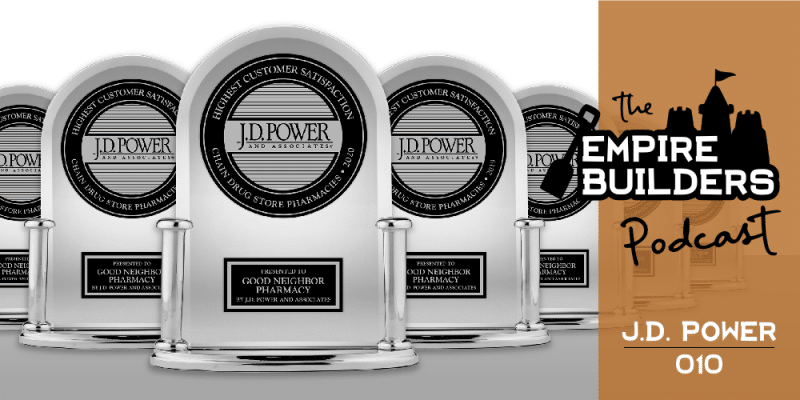Subscribe: Apple Podcasts | Google Podcasts | Amazon Music | Blubrry | RSS | More
In this episode, you will learn about J.D. Power. Started over a kitchen table on April Fools and sold later for $400M USD. This is the story of how to make your consulting service more valuable.
David Young:
Stephen, today we’re going to talk about a company that almost everybody’s heard of. Maybe? Not because of the company’s advertising to them, but because other companies are using their name in their own advertising. That seems confusing. Right? We’re talking about J.D. Power.
Stephen Semple:
J.D. Power. And a couple of interesting things on J.D. Power: J.D. Power was founded by James David Power. J.D. Power. But before we get into it, a couple of interesting things. He founded the business in 1968 on April Fool’s Day, sitting over the kitchen table with his wife, and they decided to call it J.D. Power and Associates. And in 2005, they sold this business to McGraw-Hill for $400 million.
David Young:
That’s a lot of millions.
Stephen Semple:
That’s a lot of millions! Now in case, you think McGraw-Hill was silly to pay that much money, McGraw-Hill, 11 years later, sold the very same business for $1.1 billion.
David Young:
That’s even more millions of dollars.
Stephen Semple:
That’s even more millions of dollars. [laughter]
David Young:
That’s amazing. And so from when to 2005… When did he start it?
Stephen Semple:
He started the business in 1968. So, it did very well. But here’s where the idea came from. So David graduated from the Wharton School of Business in the 50s. And he went and worked in finance for Ford and then moved over to advertising. And when he was in advertising, they discovered claims would be better if it came from the owner than Ford saying, “Hey, we’re great.” Claims are, of course, much more powerful when somebody says, “I love my Ford.” But in terms of customer satisfaction, what he really felt was that auto companies were not asking the right questions. So they really didn’t understand whether customers were satisfied or not. And so he started this whole idea of surveying the owners of the automobiles. In 1968, he decided to form a company that was going to survey the owners of the automobiles and sell that information to the auto manufacturers. So the auto manufacturers could ultimately make better vehicles.
David Young:
So really just sort of a little company that probably none of us would ever hear about because they just do kind of insider work for a specific industry. And they’re doing it as sort of a marketing service and a customer satisfaction service.
Stephen Semple:
Yeah.
David Young:
What happened? I mean, because most of those companies are still obscure. We still don’t know who they are, but they exist. They’re out there.
Stephen Semple:
Yeah. So what ended up happening, first of all, is their first customer was Toyota in terms of buying research. But the turning point happened in the ’70s when The Wall Street Journal published a story about Mazda and its survey results in terms of how Mazda was suddenly becoming significantly higher ranked in this J.D. Power survey. And then, in 1979, Chrysler became the highest rank domestic company, and they decided to run a two-page ad in BusinessWeek saying, “We are the highest-ranked domestic auto manufacturer, according to J.D. Power.” And the competition hated it. They hated it. In fact, Ford threatened to never use J.D. Power again. They said, “You know what? You got to stop doing this, or we’re not buying your research.” And in response, J.D. Power created some more categories.
David Young:
Okay, so you can be number one in something else.
Stephen Semple:
You could be number one in initial quality, and you could be number one in dependability, right? This even ramped up in 1984, when Subaru ran an ad in the Super Bowl, talking about their J.D. Power ranking. And two things happened that suddenly made it very powerful. First of all, the reason why companies kept advertising their J.D. Power results is when they advertised their J.D. Power results, sales went up.
David Young:
Sure. Nobody cares who J.D. Power is, but they say you’re number one, so, hey.
Stephen Semple:
And you had to be part of the J.D. Power survey to be number one. And you had to pay J.D. Power to survey you.
David Young:
Yeah.
Stephen Semple:
So, the really interesting thing is J.D. Power was able to take– instead of surveys being an expense, they’re able to attach surveys to the revenue side of the business. Because if you’ve got a good survey result, you could advertise it and sales would go up. But of course, you had to first of all become part of the survey before you knew the results. So you’re paying even if you’re number seven. But it was brilliant because they attached their survey result to sales outcomes. Look, people are more open to slicing the check when there’s a potential sales bump to it. Right? But it also made J.D. Power a brand in the public’s eye.
David Young:
Exactly.
Stephen Semple:
So it became a weird self-fulfilling thing. If Subaru, Mazda, The Wall Street Journal, and Chrysler, all said, “We’re number one according to J.D. Power,” guess what? It actually made J.D. Power important in the consumer’s eyes. It became a brand, and no one ever went on to explain what J.D. Power was.
David Young:
Right. I remember seeing like trophies or plaques.
Stephen Semple:
And that’s the interesting thing. It remained mysterious, and they managed to keep that mystery. And soon, all the auto companies were paying attention. And yes, in 1989, they created that trophy, and they started to hand out trophies and take pictures of trophies and made a whole bunch of best-in-class ones. Best-in-class. Best-in-class in initial quality, best-in-class in dependability. So they suddenly created a whole pile of awards. And again, when you got these awards, it impacted sales.
David Young:
It’s a beautiful story, and it’s interestingly serendipitous how they sort of locked this in because if Chrysler hadn’t touted them and bragged about their ranking, it probably would have turned out differently. If they hadn’t decided to rank auto manufacturers… Right? If they just gave them a what do we call it now? The Net Promoter Score, right?

Stephen Semple:
Yeah.
David Young:
It’s like, oh, everybody gets a Net Promoter Score. But if you’re the number one in your category, nobody does that with Net Promoter Score, right? J.D. Power was like, “No, it’s a ranking. It’s a competition now. And you just won the Super Bowl of automotive manufacturing.”
Stephen Semple:
And they were prepared to piss off some of their customers. And in the auto industry, that’s tough because it’s not like you’ve got 800 customers. You’ve got a few, and they are prepared to have Ford… Ford said, “We’re going to walk,” and they’re like, “Fine, if you want to walk, you walk.”
David Young:
You’ll never be number one.
Stephen Semple:
Right. But they called their bluff because what actually ended up happening is it is so much impacted sales is the J.D. Power award has ended up becoming one of the number one tools used in the advertising industry. Every claim is vetted by J.D. Power. You can’t use J.D. Power without J.D. Power vetting it. And here’s the really interesting thing, every time it has been used, it has made money. And on top of that J.D. Power sells research as well. And look, there’s a good part of all this. It took quality, and it made quality a big issue in advertising.
David Young:
Yeah. It probably put it on the board for designers and engineers more than it was in the past because it was just, “Hey, we just got to sell a lot of cars. Fixing cars or having bad cars is not my problem.”
Stephen Semple:
Yeah, but here’s how big it’s become. At the time I was researching this, so the data’s probably about a year old, J.D. Power had been referenced in 350,000 TV ads and 2 billion print ads.
David Young:
It’s amazing.
Stephen Semple:
That’s how big it became, which is the reason why McGraw-Hill bought it. And the reason why it was so popular is it was a big deal in the advertising industry. You know, it’s become this gold standard and was started by a guy and his wife sitting across the kitchen table on April Fool’s Day saying, “Hey, let’s call it J.D. Power and Associates.”
David Young:
“Honey, you’re the associates.”
Stephen Semple:
Exactly right. Exactly right.
David Young:
So what’s the lesson here? I think one of the things that he did was he took advantage of America’s fascination with the competition.
Stephen Semple:
Well, I think so.
David Young:
I mean, I think that’s a big part of it. And so if you can say you’re number one at something, or that you’re in a competition, that’s a big deal.
Stephen Semple:
To me, there were two big lessons that are transferable to just about any business out there. And number one is: mystery is powerful. And they’ve never talked about who J.D. Power is. All they said was “Ranked number one, according to J.D. Power.” And there’s a lot of power and mystery. And the mystery is a hard one to do because almost everybody feels this temptation to break the facade. “Well, we should say that J.D. Power is a customer.” They never said anything.
David Young:
Yeah.
Stephen Semple:
Number one, according to J.D. Power and that carried a lot of power. The other thing that they did was they managed to move… and when you’re able to charge premium prices is when you are able to attach yourself to sales results. So they were able to take their surveys and not have them indirectly attached by saying, “Well, we’re going to do these customer satisfaction surveys. You’ll figure out where you’re weak. You’ll be able to make a better product and ultimately, eventually, be able to make better sales.” While that is connected, it was a long roundabout way, which meant you were part of the expense side of the balance sheet. The moment that somebody could sit there and say “Ranked number one, according to J.D. Power” and see a sales bump… Guess what? You’re more valuable because I can attach you to sales results.
David Young:
You’re on the revenue side of the ledger now.
Stephen Semple:
And to give the listeners an example, Dave and I have done this on our own business. We run a marketing business where we attach our fees to the growth in the business. We have clients who are paying us way too much money.
David Young:
Mm-hmm (affirmative).
Stephen Semple:
Why are they happy to pay us way too much money? Because we generated sales results. So anytime you can attach your business to the revenue side outcome, you can charge a premium price.
David Young:
Thanks for listening to the podcast. Please share us, subscribe on your favorite podcast app, and leave us a big, fat, juicy, five-star rating and review at Apple Podcasts. And if you’d like to schedule your own 90 minute Empire Building session, you can do it at empirebuildingprogram.com.
- Folgers – The Best Part of Waking Up - February 21, 2026
- Red Bull’s Branding Duality - February 12, 2026
- How Alienware Spotted Unidentified Flying Opportunities - February 4, 2026

